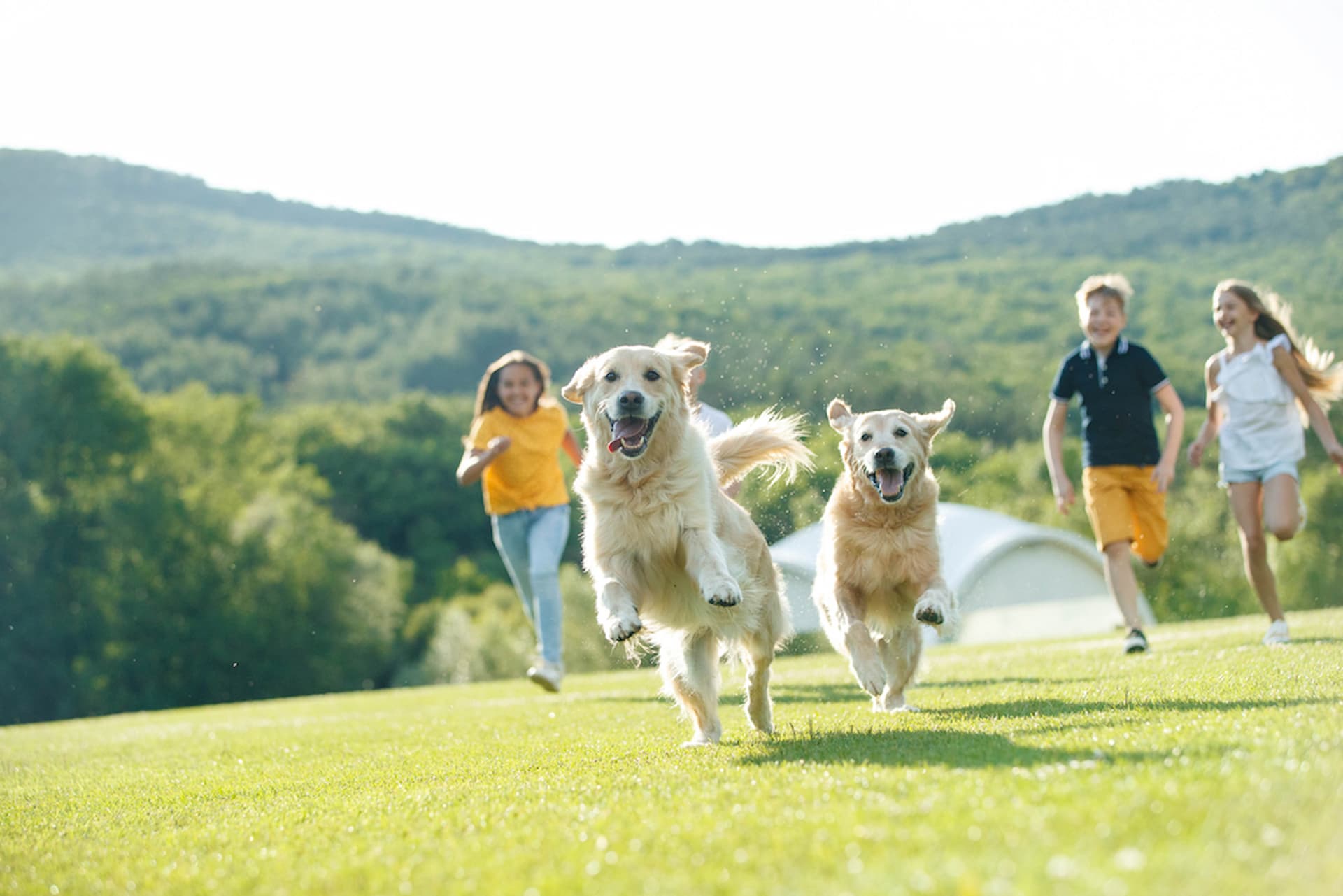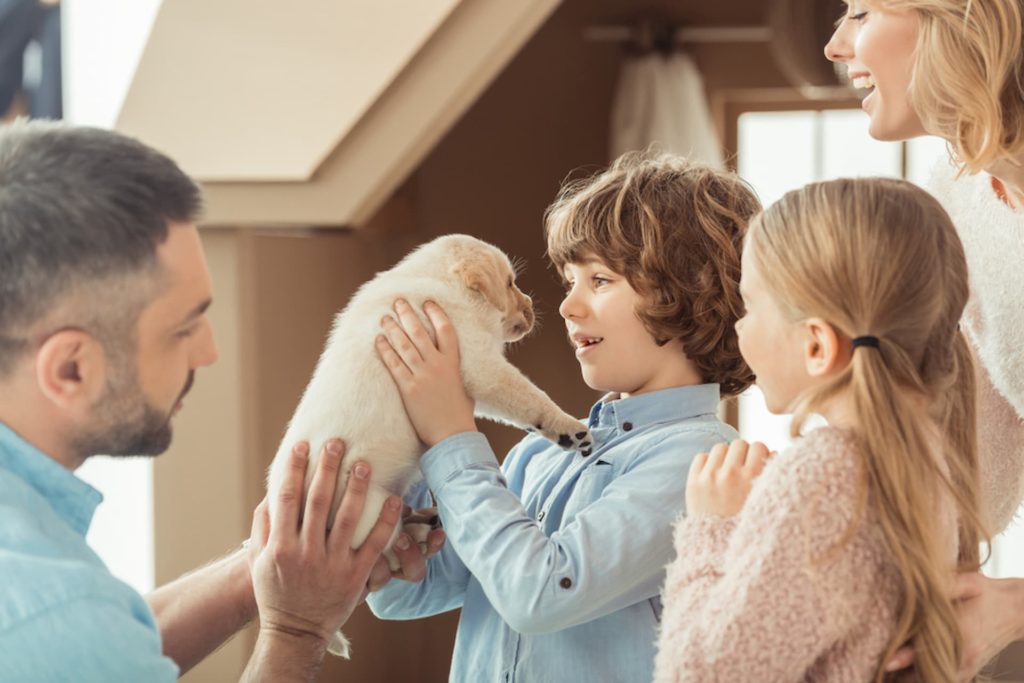Considering getting a puppy but unsure of where to start? Need a little help with tips for choosing the perfect dog for your family?
Many first-time pet parents are easily confused by all the options available to them when they start looking to give a pet a forever home. And while it’s easy to say yes to the first wagging tail and soulful-eyed puppy that you come across, the question is, should you?
One of the reasons so many pets end up in a shelter is because pet parents didn’t put enough thought into what breed will suit their family and lifestyle.
Well, if you’d like to make an informed decision but don’t know where to begin, this article is here to the rescue!

Should Your Family Get A Dog?
Before you ask the question, “How do I choose the right dog for my home?” consider whether or not your family is even ready to get a dog.
This depends on several aspects, such as whether you have the time, space, and financial ability to care for your pet, amongst other things.
We’ve covered some important pointers below.

Your Lifestyle and Personality
This is vital to consider as a dog could completely derail your schedule and overturn your life, and you must be prepared for the change.
If you have a busy schedule, you may be unable to provide your dog with the stimulation they require. There is also a chance that your dog and your personalities may not match. This could cause further problems.
For example, if your dog is enthusiastic and hyper and needs a lot of playtime, but you’re a laid-back person who prefers couch time, you could easily get frustrated with each other. For a dog, this frustration could translate to destructive behavior.
Family Size and Primary Caretaking Responsibilities
This will have the biggest influence on your experience and your dog’s quality of life. So before you bring home a pup, consider these important questions:
- How big is your family?
- Is the dog going to be cared for mostly by a younger child or an adult?
A larger family means there will be extra hands to help with pet responsibilities. This means that you could opt for a playful, energetic dog that will reflect the younger kids’ liveliness.
If you’re getting a dog for yourself, or your household demographic consists mainly of adults, you could get a ‘high-maintenance’ dog that you can care for better.
If the dog is meant for kids, it would be wiser to opt for a breed with an easy-going nature.
If you have small children or infants in the house or plan on having a baby soon, you may want to learn more about what is the safest dog for a family before deciding on a family pet.
Opt for more patient, tender, and calm dogs, as not all dogs can handle the excitement of a tiny baby!

Space/Living Environment and Finances
Larger dogs need more space to move freely and may even need a backyard to run around and play. Thus, if you live in a smaller apartment, it would be sensible to choose a smaller dog instead.
Also, think about how your finances will be affected by an additional member in the house. Dogs are not cheap—there’s food, vaccinations, toys, bedding, vet consultations, and emergencies to factor in. And some dogs may have dietary restrictions and special health concerns that require more expensive food and medication.
You can’t skimp on any of these things—neither you nor the dog deserves to compromise on quality of life. So pick a dog that is within your means and enjoy each other’s company without the struggle and resentment.
Things to Consider When Choosing a Dog
So, you’ve done the math and thought about it a lot, and decided that you are indeed all set to have a family pet. That’s great news!
Are you now wondering, “what should you look for when buying a dog?”
We’ve got you covered! Here are the determinants:
Age
A dog’s age determines many factors—from their health to personality and playfulness to obedience.
A young puppy will require training and a lot of attention. They are also extremely curious and energetic and may need a lot of time and patience before becoming well-behaved, trained dogs that don’t get into trouble.
An adolescent dog of about 12-18 months is likely to be well-trained and obedient. This may save you a lot of time, effort, and money. You can also leave them alone in the house should you have to go somewhere.

Breed
Different breeds have varying requirements in terms of weather, environment, food, and exercise.
For example, huskies belong in colder climates, and keeping them in a warmer area would be unfair. At the very least, you would need to have the air conditioner on at all times.
Pugs are considered extremely high maintenance as their health is extremely delicate, and they require continuous medical attention and care.
Certain breeds are also meant for specific living conditions or roles. For example, a larger dog breed may double as a guard dog, thereby helping to keep you, your family, and your home safe if you live in remote areas.
You must thus decide if you want a mixed breed/mutt or a purebred.
Personality
Before you adopt or buy a dog, it is important to be acquainted with its personality.
Are they shy, timid, and easily scared? Do they get nervous or anxious a lot? These could be symptoms of dogs prone to developing separation anxiety. Consider whether you can care for them accordingly.
Is the dog playful and energetic? Are they extremely active and curious? These are endearing traits but could lead to behavioural issues if not adequately trained.
Though the dog’s personality may change as you spend time with it, certain things are inherent and shall remain throughout. So make sure that your dog’s personality matches your ability to care for it.

Health
A healthy dog is a happy dog, and which pet parent wouldn’t want that? Now, you’re probably wondering, ‘How do I know if my puppy is healthy to buy?’
Though you should speak to a vet to get their professional opinion, the following are signs of a healthy dog:
- Healthy, clean skin without scabs, fleas, white flakes, or redness
- A shiny, thick coat
- Bright, sparkling eyes
- A cool, moist nose
- Clean, firm gums
- 101-102.5* temperature
- Clear, yellow urine
- Healthy heartbeat and weight
It is also important to inquire about the parentage, family medical history, predisposition to hereditary diseases, vaccinations, and other health requirements.
Some dogs may be delicate and succumb to ailments more easily. Don’t put yourself and your family through that trauma. Ask difficult questions so you know exactly how to care for your dog.
Size
Dogs come in all shapes and sizes, literally! From tiny Chihuahuas that could easily slip into your purse to large Saint Bernards that make a grown person look small – it’s almost impossible to pick.
Before you settle on a dog, think about whether they will fit comfortably in your home and family and if you shall be able to provide for them efficiently.
Top 5 Family Dog Breeds
While several quizzes online could help you figure out what breed is best suited to your family, they may not be conclusive.
Here are some of the most popular family dog picks amongst dog-lover in general:
Beagles
They are easy-going, affectionate, and extremely lovable. Beagles are also great with children and other animals.
Pugs
These little ones are patient, playful, and absolutely harmless – perfect for homes with children.
Bulldogs
They are well-known for being caring toward children. They are also extremely loyal and affectionate.
Poodles
They are smart, gentle, and good-natured. They don’t shed too much either, so they’re also great for those with allergies!
Golden Retrievers
They are among the friendliest dog breeds, loyal, easy to train, and extremely eager to please. Adults and children are all huge fans of this breed all across the world!

Final Thoughts
Buying a dog is exciting for the whole family. So why not get everyone involved in the discussions surrounding the big decision? Now that you’re armed with our tips for choosing the perfect dog for your family, you’ll find the selection process so much easier
Before you finalize things, here are a few extra pointers to make sure everything goes smoothly:
- Consult your vet to ensure that you know what you’re in for.
- If possible, adopt from a shelter instead of buying a dog.
- Give the dog some time to warm up to you.
- Be prepared to make some major lifestyle changes and adjustments to accommodate your dog.
- Don’t get a puppy if you won’t be able to train and supervise it – they’re quite a handful.
Remember That You’re Making A Commitment To Love And Cherish Your Dog Forever.



